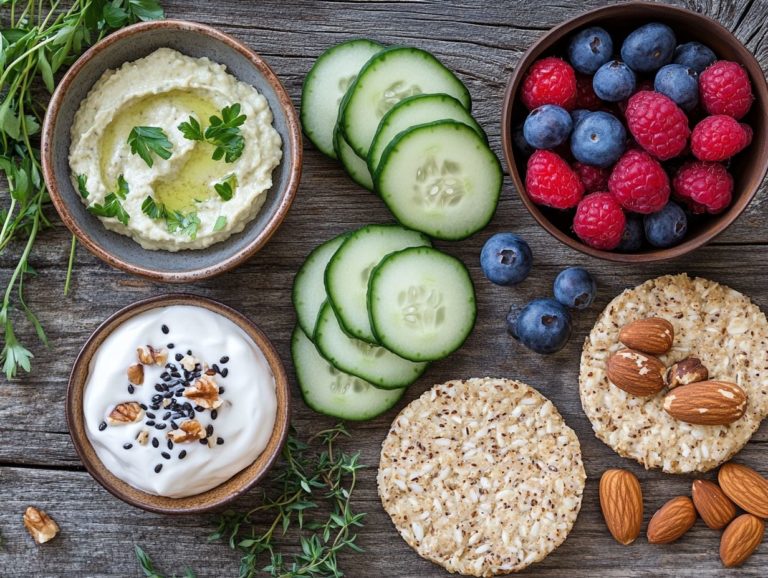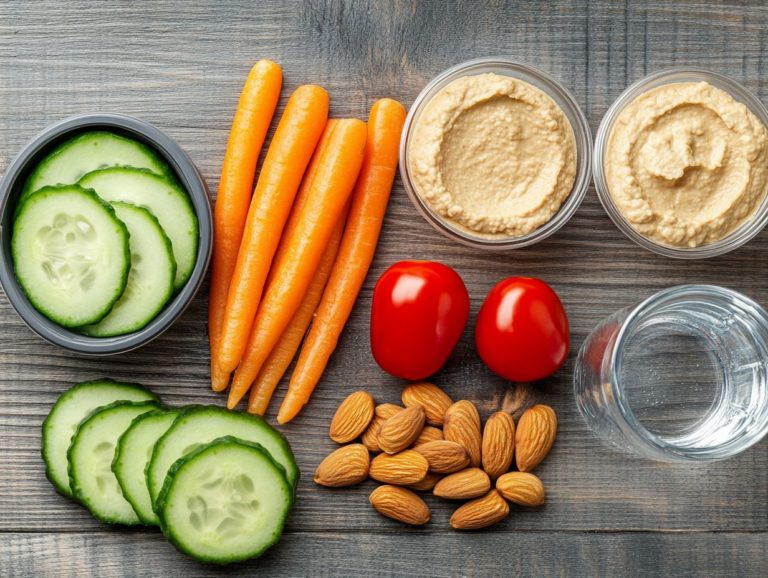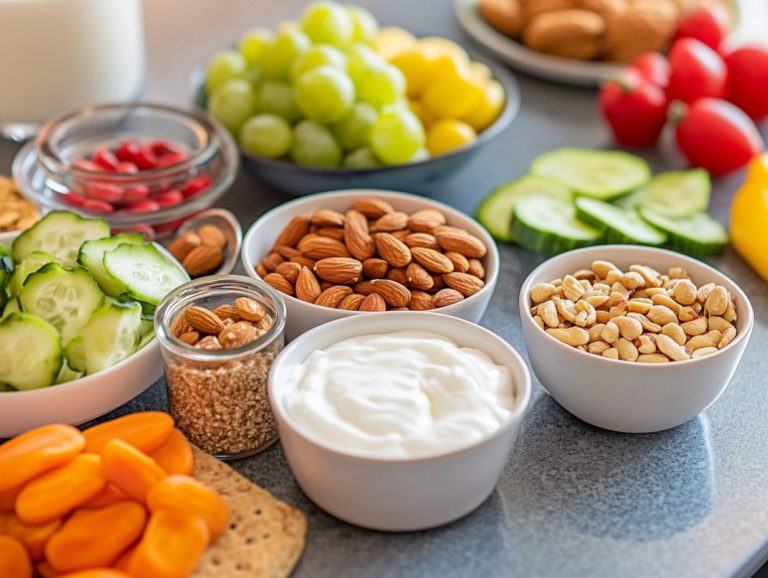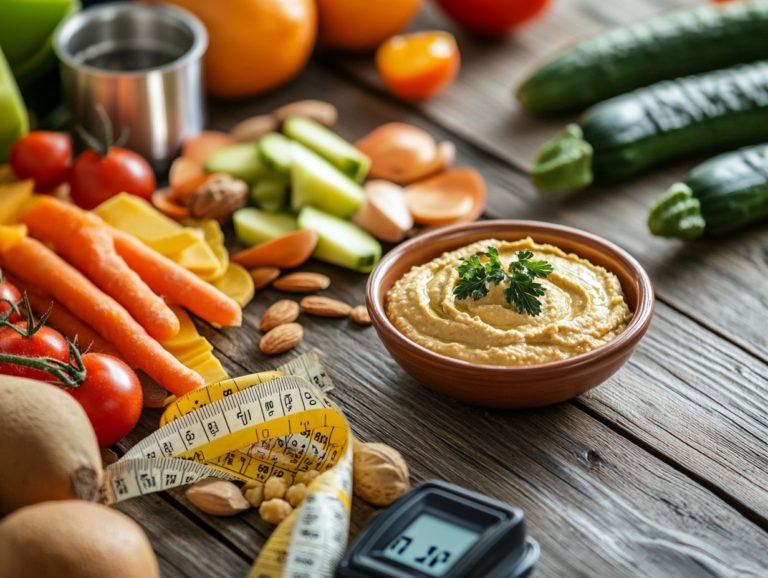The Science Behind Low-Calorie Snacks
In today s health-conscious world, it s crucial to fill your snack pantry with healthy options that boost your energy and delight your taste buds! Incorporating healthy snacks into your routine has become essential if you’re looking to maintain a balanced diet and manage your calorie intake without sacrificing flavor.
These snack foods not only assist with weight loss and prevent weight gain, but they also come with a host of other benefits, making them a smart choice for anyone aiming to enhance their eating habits and boost their nutritional quality.
This article delves into the importance of low-calorie snacks, presents some enticing examples, and shares tips on how to make them both filling and delicious, ensuring you enjoy healthful eating. Prepare to discover delightful recipes and actionable advice that will keep you satisfied and energized!
Contents
- Key Takeaways:
- What Are Some Other Benefits of Low-Calorie Snacks?
- What Are Some Examples of Low-Calorie Snacks?
- 1. Fruits and Vegetables
- How Can You Make Low-Calorie Snacks More Filling?
- What Are Some Tips for Choosing Low-Calorie Snacks?
- 1. Read Nutrition Labels
- 2. Stick to Whole Foods
- 3. Plan Ahead
- What Are Some Delicious Low-Calorie Snack Recipes?
- Frequently Asked Questions
Key Takeaways:
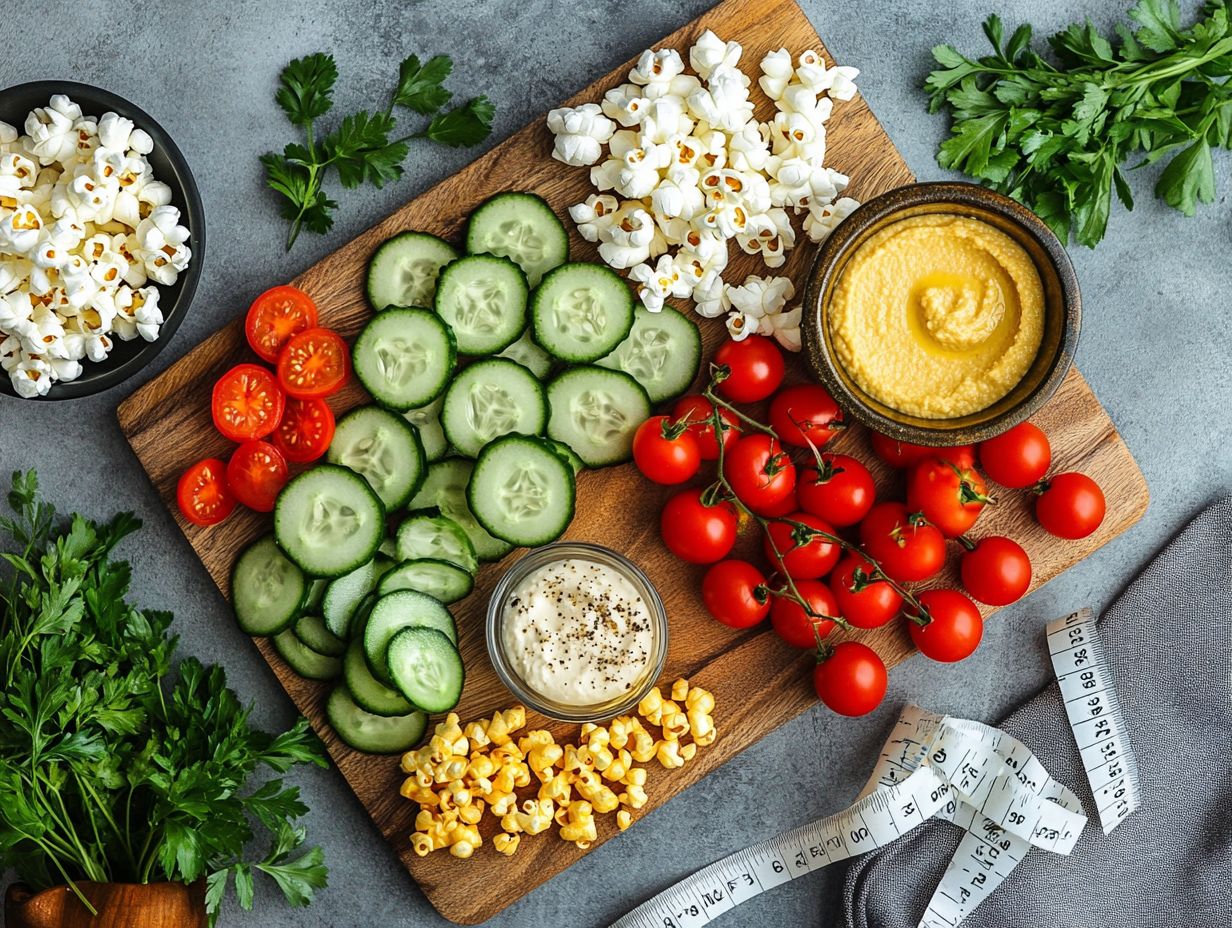
- Low-calorie snacks are foods that are low in calories but still provide essential nutrients. They can aid in weight loss and have many other health benefits.
- Low-calorie snacks can be made more filling by adding protein, healthy fats, and high-fiber options. This can help you stay satisfied longer and avoid overeating, improving your satiety and overall health outcomes.
- When choosing low-calorie snacks, it is important to read nutrition labels, stick to whole foods, and plan ahead. This can help you make healthier choices and avoid high-calorie processed snacks, enhancing your mindful eating habits.
What Are Low-Calorie Snacks?
Low-calorie snacks are your go-to options when you want satisfying taste and texture without packing on the calories. They re perfect for anyone who is mindful of their dietary intake. Think fresh fruits and vegetables, yogurt, and nuts; these snacks not only help satisfy your hunger but also enhance your nutrient intake, allowing you to make choices that support your overall health and nutritional quality.
Incorporating such snacks into your daily snacking habits can also prevent unwanted weight gain. Integrating low-calorie snacks into a balanced diet can elevate your sense of fullness while offering a delightful array of flavors and textures, ensuring that snacking remains a pleasurable experience for everyone including children, thereby influencing positive snacking behavior from a young age.
Why Are Low-Calorie Snacks Important?
Low-calorie snacks are essential for maintaining a balanced diet, particularly if you re focused on weight management and overall health. They offer a satisfying way to indulge your cravings without overwhelming your calorie count, effectively helping you prevent weight gain and supporting a healthier lifestyle.
By integrating low-calorie snacks into your daily routine, you cultivate mindful eating habits that align with dietary guidelines promoting healthful choices. These snacks also hold special significance for children, as they lay the foundation for lifelong snacking behaviors and food preferences that can greatly influence their long-term health and overall well-being.
How Do Low-Calorie Snacks Help With Weight Loss?
Low-calorie snacks can be a game-changer in your weight loss journey, allowing you to savor delicious options without tipping the scales on your daily calorie intake. They promote a sense of fullness, effectively curbing your hunger and reducing the frequency of snacking. This is particularly beneficial in reducing emotional eating triggers that often lead to unwanted weight gain and increased snacking frequency.
By thoughtfully incorporating these snacks into your balanced diet, you can maintain your energy levels while diligently working toward your weight loss goals and preventing unhealthy snacking patterns. These snacks are typically rich in fiber and protein, two essential nutrients that enhance feelings of satiety and help keep cravings at bay.
For instance, enjoying fruits, vegetables, or carefully portioned nut mixes can deliver vital nutrients without piling on excessive calories. Embracing low-calorie options allows you to strike a satisfying balance, enabling you to indulge without the weight of guilt or the anxiety of derailing your progress, thus supporting better health outcomes and dietary intake.
This harmonious blend of enjoyment and moderation cultivates a sustainable lifestyle change, making it significantly easier for you to adhere to a weight management plan and ultimately achieve lasting success.
What Are Some Other Benefits of Low-Calorie Snacks?
Beyond aiding in your weight loss journey, low-calorie snacks bring a wealth of benefits that enhance your overall health and wellness. They improve the nutrients they provide and help you maintain a balanced dietary intake.
These snacks can replace meals. They deliver essential nutrients and keep your calorie intake low. They also support the variety effect, promoting greater satisfaction and helping you stick to healthful eating patterns.
By incorporating a variety of low-calorie snacks, you can experience the variety effect and enjoy greater satisfaction. Choosing wholesome alternatives over processed snacks can lead to significantly better health outcomes, reducing the risk of nutritional insufficiencies and other health issues.
By prioritizing foods that are low in calories yet high in vitamins and minerals, you can elevate your overall dietary quality. This mindful choice not only aids in weight management but also supports your energy levels throughout the day, reducing the allure of unhealthy eating and energy-dense, nutrient-poor food choices.
Low-calorie options like fruits, vegetables, and lean proteins not only curb your hunger but also ensure your body receives the necessary nutrients. Ultimately, embracing these healthier snack alternatives fosters a more mindful eating approach, enhancing your emotional well-being while helping you maintain a balanced lifestyle. This can be particularly beneficial for children snacking, as it promotes healthier food choices from a young age.
What Are Some Examples of Low-Calorie Snacks?
You ll find a plethora of low-calorie snacks at your disposal, allowing you to select options that cater to your personal preferences and dietary requirements. From fruits and vegetables to yogurt and nuts, the variety is endless.
Healthy choices like fresh fruits and vegetables deliver essential vitamins and minerals without piling on the calories. Whole grain crackers and yogurt add a delightful crunch and creaminess to your snacking experience, respectively. These snacks also align with dietary guidelines that promote healthful eating.
While nuts might carry a higher calorie count, enjoying them in moderation can provide you with beneficial healthy fats and protein. Air-popped popcorn stands out as a versatile treat that can be seasoned to your liking, transforming it into a fun and low-calorie indulgence. These snacks can be great for both adults and children, promoting healthier snacking behavior.
These tasty options prove that snacking is not just fun it’s a smart choice for your health, contributing positively to your overall dietary intake and long-term health outcomes.
1. Fruits and Vegetables
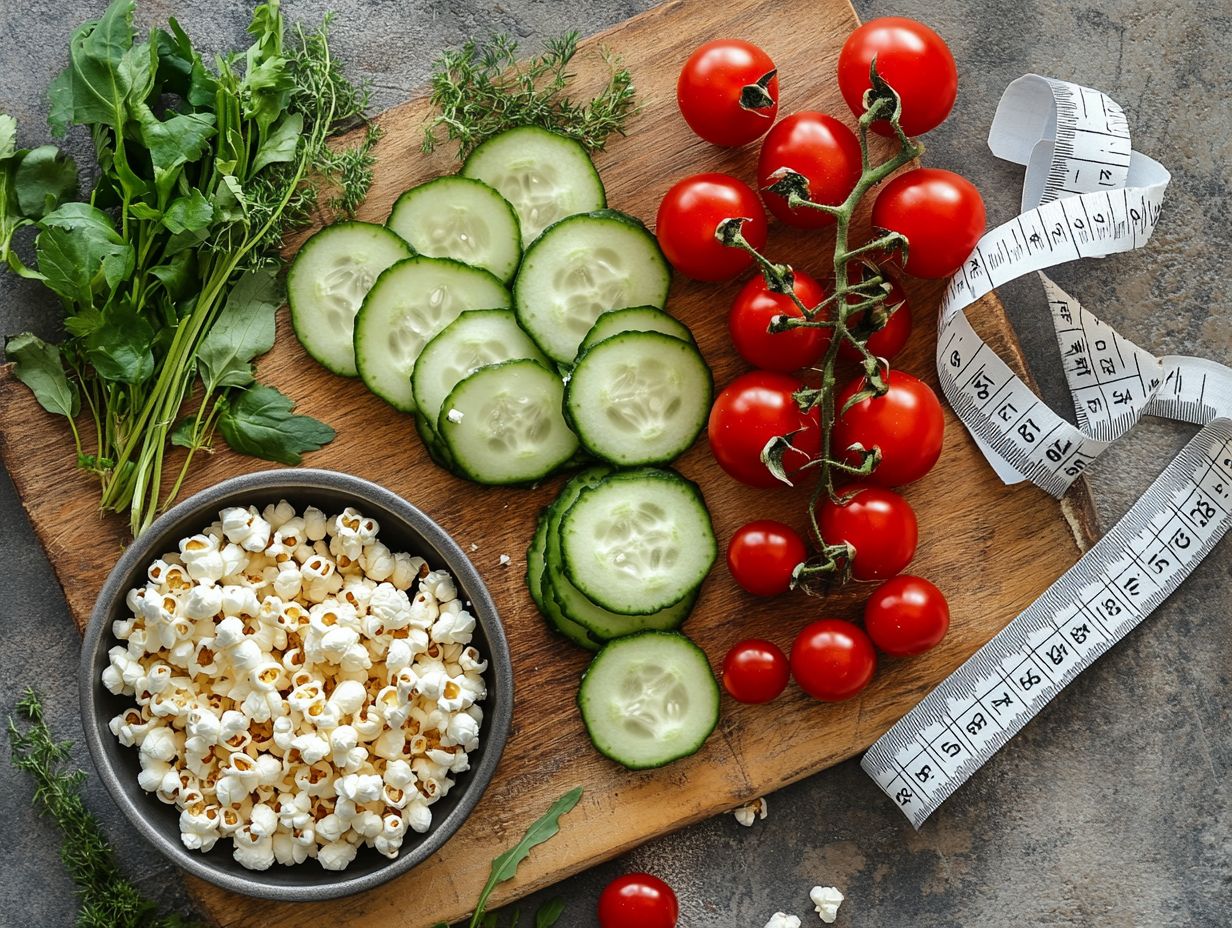
Fruits and vegetables serve as exceptional low-calorie snacks that not only satisfy your cravings but also deliver a wealth of nutrients, positively impacting your health outcomes. Packed with vitamins, minerals, and fiber, they are perfect for anyone looking to maintain or lose weight without sacrificing flavor. These snacks also align well with dietary guidelines for promoting healthful eating.
Among these nutritious delights, cucumbers and bell peppers shine with their refreshing crunch, while berries such as strawberries and blueberries offer a delightful natural sweetness. Incorporating these foods into your diet can be both simple and enjoyable.
Imagine tossing together a vibrant salad with mixed greens, cherry tomatoes, and a handful of walnuts this not only adds texture but also elevates the overall flavor profile. Such combinations can reduce the need for high-calorie, processed snacks.
For another creative spin, consider making smoothies that include spinach or kale, blended with bananas and almond milk for a delicious, nutrient-packed treat. These fruits and vegetables not only assist in managing your calorie intake but also enhance your overall well-being. This creates a win-win situation for anyone seeking healthier snacking alternatives, and they can also be excellent snacks for kids, encouraging them to develop healthful eating habits.
Start your snacking journey today! Pick your favorites from this list and enjoy a healthier lifestyle. Don’t wait make the switch to low-calorie snacks today and feel the difference!
Snack Options for Health-Conscious Eaters
Here are some delicious and nutritious low-calorie snack options to enjoy.
2. Whole Grain Crackers
Whole grain crackers are an exceptional choice for low-calorie snacking. They offer a satisfying crunch while delivering essential fiber that promotes satiety and aids in digestion. Their versatility allows you to pair them with various toppings, making them a delightful addition to your snack repertoire and a great option for meal planning.
These wholesome crackers are not just full of nutrients; they provide a satisfying crunch that elevates any healthy topping you choose. Imagine spreading a velvety layer of avocado or hummus; this adds creaminess and enhances your intake of healthy fats. Fresh vegetables like cucumber or bell pepper can bring an extra burst of vitamins and minerals to your snack. Such combinations can significantly improve your nutritional quality and overall health outcomes.
Thanks to their whole grain goodness, these crackers ensure a slow release of energy. This makes them an ideal choice for maintaining balanced blood sugar levels. By incorporating these delightful snacks into your diet, you can enhance both your overall health and your culinary experience. They are also a great option for home-cooked snacks, allowing for greater control over portion sizes and ingredients.
3. Yogurt
Yogurt stands out as a delightful low-calorie snack packed with protein and calcium. It provides that creamy texture you crave while keeping calories in check. You can easily elevate its flavor by adding fruits or nuts, enhancing both taste and nutrition. Yogurt improves your nutrient intake and supports a balanced diet.
This versatile dairy delight satisfies your cravings and offers potential probiotic benefits, which are good bacteria that support digestion. Picture a delicious parfait with layers of yogurt, crunchy granola, and fresh berries, ready to tantalize your taste buds! Blending it into smoothies for a quick burst of nutrients is another great idea. Such options can improve your satiety and provide a healthier alternative to high-sugar, processed snacks.
For a savory twist, a dollop of yogurt can elevate the flavor of soups and salads, making it a fantastic option for anyone striving to maintain a balanced diet. With so many delectable possibilities, enjoying the healthful advantages of yogurt is not just easy it’s downright enjoyable. Yogurt also aligns with dietary guidelines that emphasize the importance of nutrient-rich, low-calorie foods.
4. Nuts and Seeds
Nuts and seeds, though high in calories, can seamlessly fit into your low-calorie snacking strategy when you keep an eye on portion sizes. They provide a delightful combination of healthy fats and protein that promotes satiety, making them a satisfying choice whether enjoyed solo or incorporated into various snack recipes.
These tiny powerhouses are brimming with essential nutrients like omega-3 fatty acids, fiber, and antioxidants, all of which contribute to heart health and overall wellness. Incorporating a modest handful of almonds, walnuts, or sunflower seeds as an afternoon snack can effectively curb your hunger and reduce cravings for less nutritious options.
To maintain a balanced intake, it’s wise to measure out a portion instead of mindlessly snacking straight from the bag. This helps you appreciate their nutrient density and keeps those calories in check. By focusing on moderate portions, you can enjoy lasting satisfaction without compromising your dietary goals.
5. Air-Popped Popcorn
Air-popped popcorn is your go-to low-calorie snack that s bursting with fiber and can be seasoned to match your personal taste. With its minimal calorie count, it s the perfect answer to those cravings, allowing you to indulge without straying from your healthy eating plan.
This delightful snack provides a satisfying crunch and comes packed with health benefits that make it a standout choice for any diet. Crafted using hot air to pop the kernels, air-popped popcorn sidesteps the unhealthy oils and fats typically associated with traditional popcorn-making methods. This unique technique preserves the natural goodness of the corn, resulting in a deliciously light texture.
With approximately 3.5 grams of fiber per serving, it s an excellent ally for digestive health, especially if you re looking to boost your fiber intake. In terms of flavor, the possibilities are endless. Don t miss out on this tasty, guilt-free snack that you can whip up in minutes! Whether you enjoy a simple sprinkle of sea salt, a dash of nutritional yeast for that cheesy goodness, or a drizzle of melted dark chocolate for a touch of sweetness, air-popped popcorn is ready to cater to your diverse palate.
How Can You Make Low-Calorie Snacks More Filling?
To make low-calorie snacks more filling, focus on incorporating specific ingredients that enhance their nutritional value without compromising on calorie count.
By adding protein sources like Greek yogurt or nuts, introducing healthy fats, and opting for high-fiber choices, you can craft snacks that deliver greater satiety and satisfaction. This transforms your snacking experience into one that is both nutritious and enjoyable.
1. Add Protein
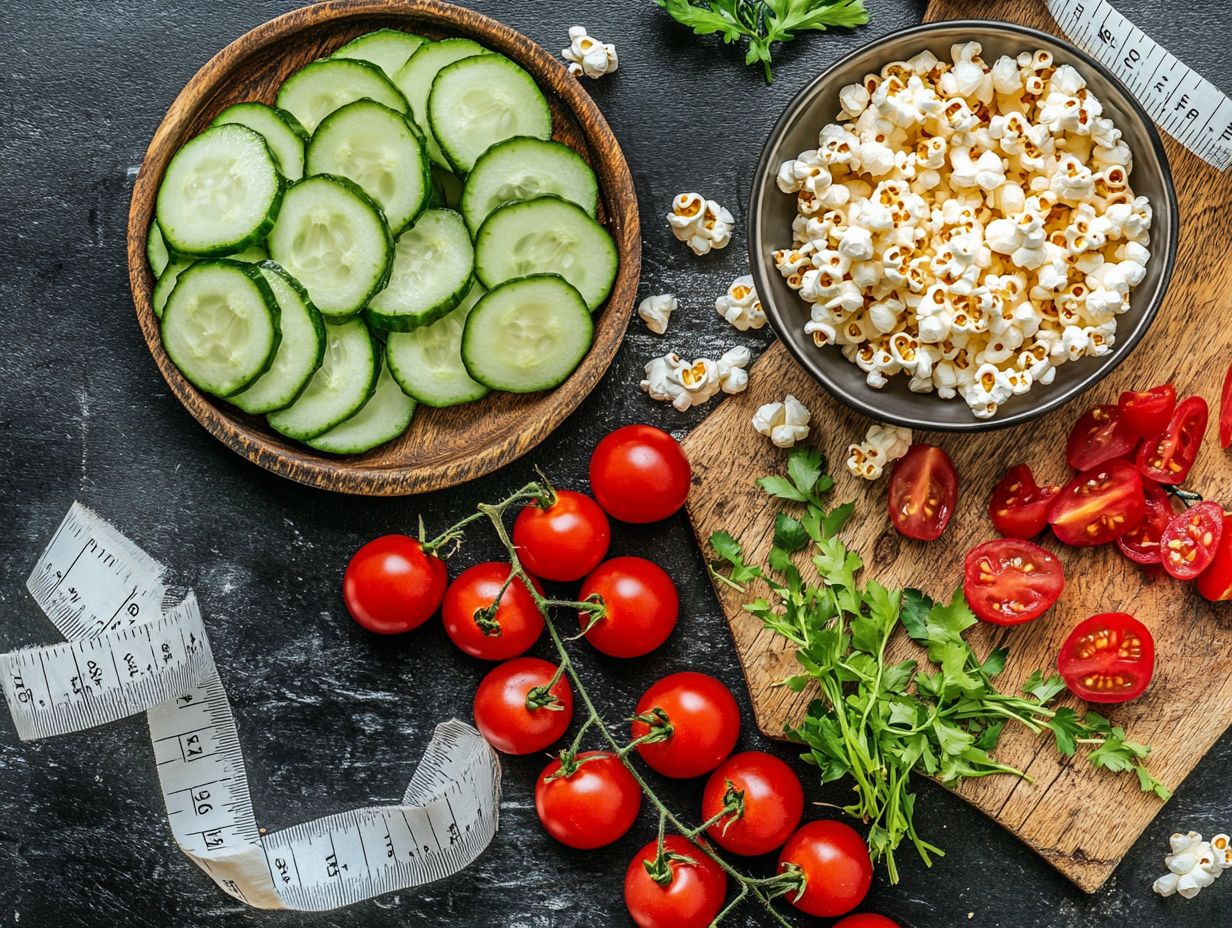
Incorporating protein into your low-calorie snacks is a savvy strategy that enhances satiety and helps tame those annoying hunger pangs.
Try delicious Greek yogurt, nuts, or even a scoop of protein powder to elevate the nutritional value of your snacks.
Adding these protein sources extends fullness. This helps you resist less nutritious cravings. For example, Greek yogurt boasts a creamy texture and is brimming with probiotics that support gut health.
Nuts offer a delightful crunch while providing healthy fats that nourish your heart and sustain your energy levels. Plant-based protein powders can be effortlessly mixed into smoothies or oatmeal, adding a burst of flavor while ensuring you get a solid protein boost.
This thoughtful approach to snacking helps you manage your weight and promotes your overall well-being.
2. Incorporate Healthy Fats
Incorporating healthy fats into your low-calorie snacks can significantly enhance their ability to satisfy, making it easier for you to feel full and content.
- Nuts
- Avocados
- Almond butter
These heart-healthy fats work wonders by slowing down digestion and regulating hunger hormones, effectively curbing cravings between meals.
For example, pairing apple slices with almond butter not only adds delightful flavor but also delivers nutrients that promote sustained energy.
A handful of mixed nuts or a delicious avocado smoothie can serve as fulfilling options that support your overall wellness and appetite control. Integrating these nutritious snacks into your daily routine allows you to manage hunger and make mindful eating choices with greater ease.
3. Choose High-Fiber Options
Choosing high-fiber options is crucial for transforming low-calorie snacks into satisfying delights. Fiber enhances satiety, allowing you to feel fuller while reducing overall calorie intake.
Consider indulging in hummus paired with crisp carrot sticks or enjoying whole-grain crackers alongside zesty guacamole both combinations deliver a perfect balance of flavor and nutrition.
- Nuts and seeds
- Air-popped popcorn
- Chia seed pudding
These joyful, high-fiber additions to your snacking routine help quell hunger and support digestive health. As you transition to higher fiber snacks, you ll find it both effective and enjoyable, contributing to a well-balanced diet.
What Are Some Tips for Choosing Low-Calorie Snacks?
Selecting low-calorie snacks thoughtfully requires attention to nutrition labels, ingredient quality, and portion sizes. This ensures that your choices support your healthful eating decisions and align seamlessly with your dietary goals.
Prioritize whole foods that are minimally processed; they typically offer superior nutrient density and play a significant role in enhancing your overall meal planning.
Incorporating these tips into your daily snacking habits can make a big difference! Try experimenting with different combinations to discover what keeps you satisfied.
1. Read Nutrition Labels
Reading nutrition labels is an essential step in your quest for low-calorie snacks, providing you with valuable insights into calorie content, sugar levels, sodium, and fat. This knowledge gives you the power to make informed decisions about your snacking habits, helping you steer clear of nutrient-poor processed options that could derail your health goals.
Navigating these labels is vital, especially in today s market where countless products tout themselves as healthy. By paying attention to the serving size, you can better evaluate how the calories and nutrients like carbohydrates, proteins, and fats align with your dietary needs. Be vigilant about the sugar content; remember, not all sugars are created equal. Some may be added sugars that sneak in extra calories, while a low-sodium option can be a boon for your heart health.
Evaluate the types of fats listed whether they re trans fats or healthier alternatives to help you choose snacks that enhance your overall well-being.
2. Stick to Whole Foods
When you choose low-calorie snacks, sticking to whole foods is the way to go. This approach maximizes nutrient density, which is the amount of nutrients compared to the calories in a food, while minimizing your exposure to processed snacks that often come with unhealthy additives. Whole foods think fresh fruits and vegetables are brimming with essential nutrients that can lead to better health outcomes.
Incorporating these nutrient-rich options into your daily routine not only supports your physical health but also elevates your mental well-being. Whole foods are loaded with vitamins, minerals, and antioxidants that help boost your immunity and reduce the risk of chronic diseases. In contrast, processed snacks are often packed with excess sugar, unhealthy fats, and preservatives, making them less favorable choices. Whole foods promote stable energy levels and enhance satiety, making it easier for you to resist those unhealthy cravings.
By opting for simple snacks like nuts, seeds, or yogurt, you can cultivate a more mindful eating habit, fostering a deeper connection with what you consume.
3. Plan Ahead
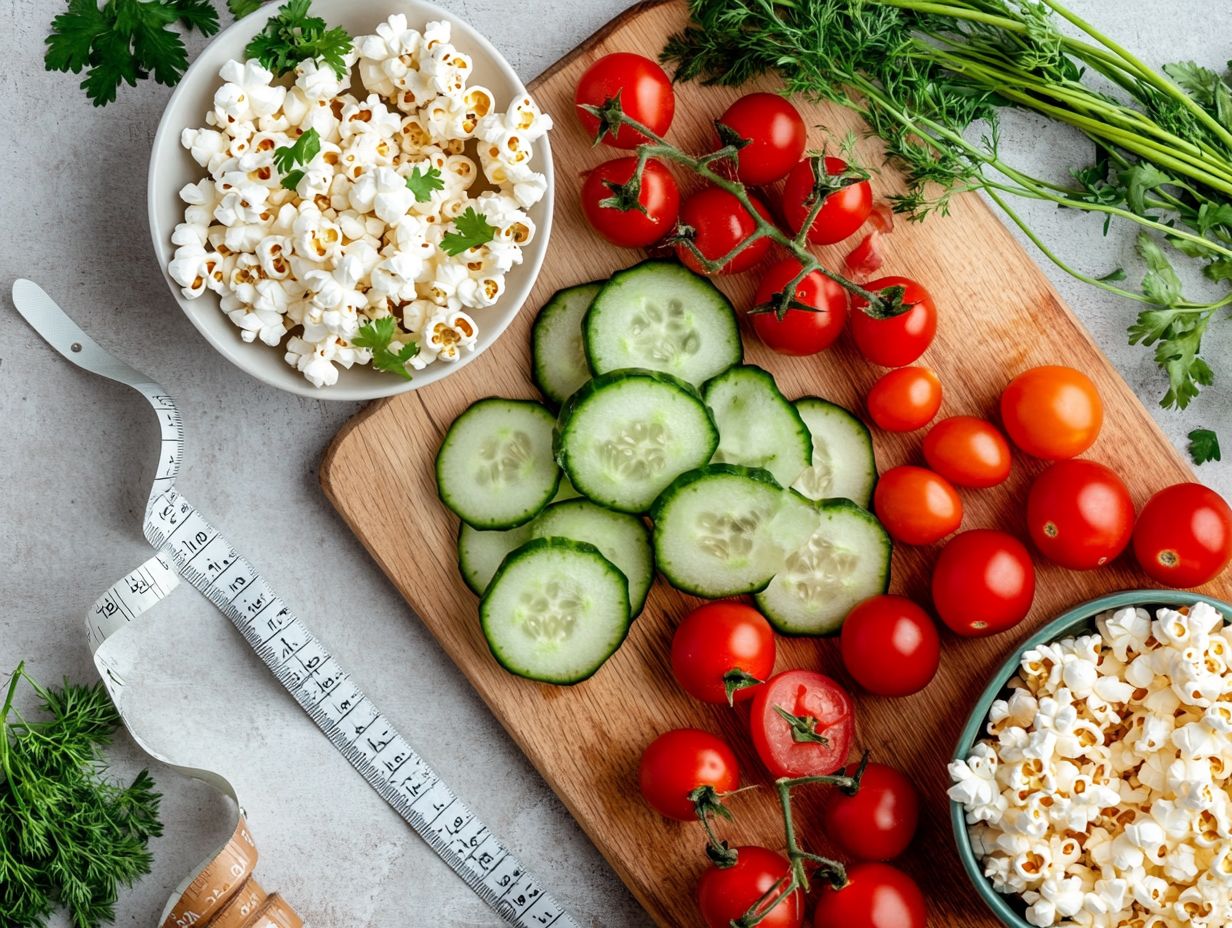
Planning ahead for low-calorie snacks is your secret weapon for ensuring healthy options are always at your fingertips. This approach prevents those impulsive snack attacks that often lead to unhealthy choices and an unnecessary spike in calorie intake. By pre-portioning your snacks and weaving them seamlessly into your meal planning, you can establish a balanced eating strategy throughout the day.
This proactive method not only lets you satisfy your cravings without veering off track from your dietary goals but also fosters mindful eating habits. Incorporating snacks like fresh fruits, crunchy vegetables with hummus, or low-calorie yogurt can significantly enhance your overall nutrition.
Utilizing a planner to map out snack times and employing simple containers for portion control can effectively keep those tempting indulgences at bay. By carefully selecting low-calorie snacks that align with your nutritional needs, you can enjoy a structured eating routine while still treating yourself to delicious flavors, ultimately supporting your health and fitness aspirations.
What Are Some Delicious Low-Calorie Snack Recipes?
Indulging in delicious low-calorie snack recipes allows you to savor satisfying flavors while keeping your commitment to healthy eating intact. Whether you re enjoying a refreshing fruity yogurt parfait or relishing savory air-popped popcorn seasoned with aromatic herbs, these recipes offer a delightful array of options.
You can elevate your snack game and stay aligned with your dietary goals, all without sacrificing taste or enjoyment.
Frequently Asked Questions
What is the science behind low-calorie snacks?
The science behind low-calorie snacks is based on the concept that consuming fewer calories than what your body burns leads to weight loss. By choosing snacks that are lower in calories, you can still satisfy your hunger and cravings without consuming excessive amounts of calories.
How do low-calorie snacks help with weight loss?
Low-calorie snacks help with weight loss by providing a smaller amount of calories, making it easier to maintain a calorie deficit. This deficit leads to weight loss as the body uses stored fat for energy.
Can low-calorie snacks still be nutritious?
Yes, low-calorie snacks can be nutritious. They can contain a variety of vitamins, minerals, and other important nutrients.
What are some examples of low-calorie snacks?
Examples of low-calorie snacks include fruits, vegetables, whole-grain crackers, air-popped popcorn, and low-fat dairy products. These snacks are typically lower in calories and provide a good balance of nutrients.
Do low-calorie snacks have any other health benefits?
Apart from aiding in weight loss, low-calorie snacks can provide other health benefits. They often contain high amounts of fiber, vitamins, and antioxidants, which contribute to these benefits. This can help reduce the risk of long-term health problems like heart disease and diabetes.
Are all low-calorie snacks equally healthy?
No, not all low-calorie snacks are equally healthy. Some may be high in added sugars, sodium, or unhealthy fats, which can outweigh the benefits of being low in calories. Choose snacks made from whole, natural ingredients. By avoiding processed options, you can maximize your health benefits and truly enjoy snacking!

